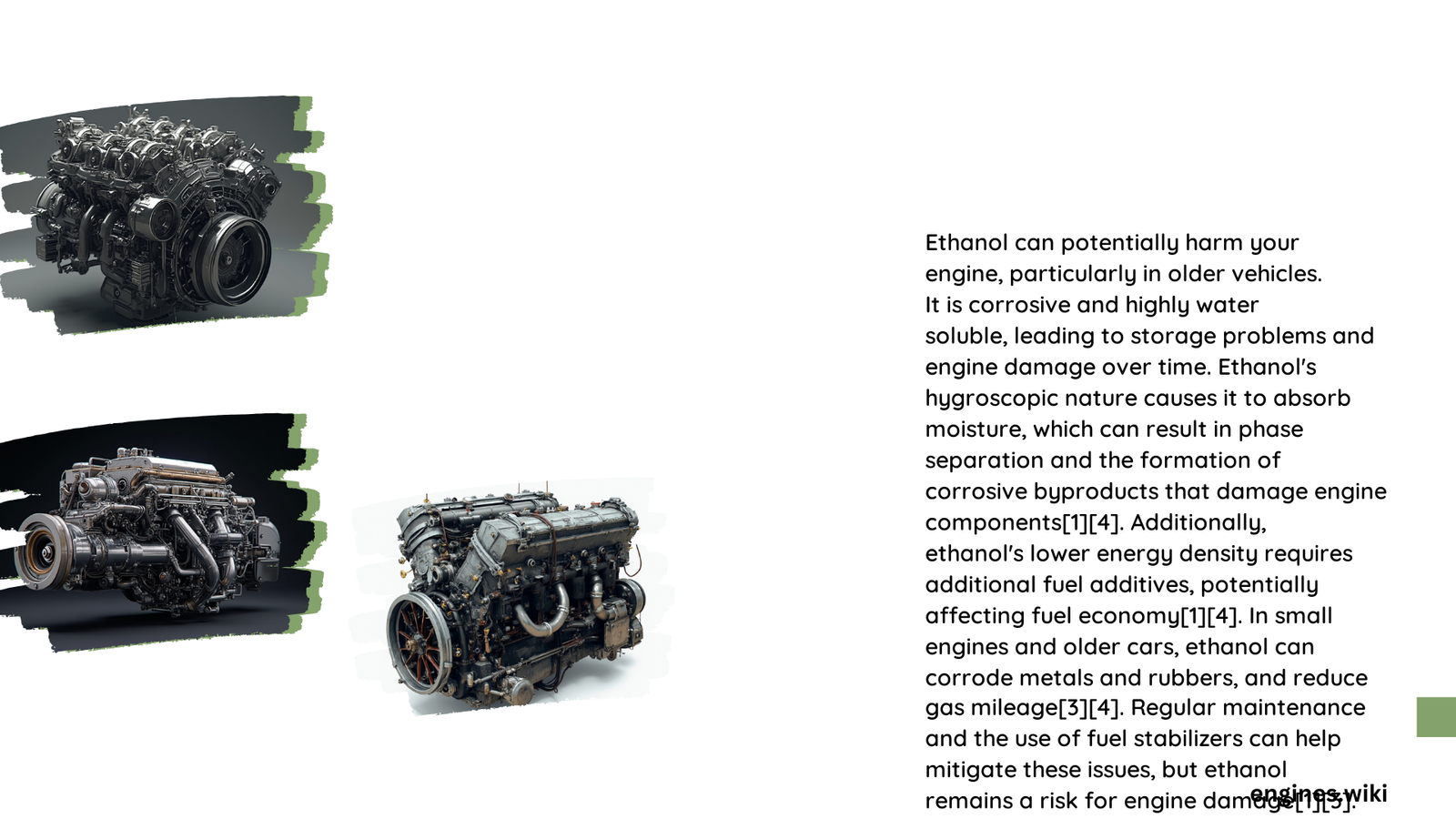Ethanol in fuel can potentially harm engines, especially older ones not designed for it. While modern vehicles can handle low ethanol blends, higher concentrations may cause corrosion, material degradation, and performance issues. The impact varies based on engine type, ethanol concentration, and vehicle age. Understanding these effects is crucial for maintaining engine health and performance.
What Are the Mechanisms of Ethanol-Induced Engine Damage?
Ethanol can damage engines through several mechanisms:
- Corrosion and Oxidation:
- Ethanol attracts moisture, increasing rust and corrosion risk
-
Forms salt deposits and jelly-like substances that clog components
-
Phase Separation:
- Ethanol can separate from gasoline in the fuel tank
-
Creates a layer of ethanol and water, causing lean fuel conditions
-
Material Degradation:
- Acts as a solvent, degrading plastic, rubber, and certain metals
-
Particularly corrosive to ferrous metals
-
Combustion Efficiency:
- Higher octane rating but lower energy density than gasoline
- Can cause premature ignition in engines not designed for high ethanol content
How Does Ethanol Compatibility Vary Across Engine Types?

Ethanol compatibility differs significantly across engine types:
| Engine Type | Ethanol Compatibility |
|---|---|
| Pre-2001 Gasoline Engines | Most susceptible to damage |
| Post-2001 Gasoline Engines | Generally compatible with E10 and E15 |
| Flex-Fuel Engines | Designed for blends from E10 to E85 |
- Standard Gasoline Engines:
- Older engines (pre-2001) are more vulnerable
-
Newer engines can handle E10 and E15 without significant issues
-
Flex-Fuel Engines:
- Designed for various ethanol blends
-
Can run on E10 to E85
-
Compatibility Thresholds:
- E10 (10% ethanol): Compatible with most modern engines
- E15 (15% ethanol): Safe for 2001 and newer models
- E85 (85% ethanol): Only for flex-fuel vehicles
What Are the Quantified Effects of Ethanol Corrosion on Engine Materials?
Ethanol corrosion affects various engine components:
- Fuel Lines and Gaskets:
- Degrades rubber and plastic components
-
Can lead to leaks and failures over time
-
Injectors and Carburetors:
- Dissolves old deposits, potentially clogging fuel systems
-
May reduce fuel pressure and increase pump wear
-
Degradation Rates:
- Reduces fuel shelf life from 6 months to about 3 months
- Rate depends on ethanol concentration, storage conditions, and material types
How Does Ethanol Impact Engine Performance?
Ethanol affects engine performance in several ways:
- Fuel Efficiency:
- E10 blends can reduce efficiency by 3-5% compared to pure gasoline
-
Due to ethanol’s lower energy density
-
Power Output:
- Slight decrease in horsepower and overall performance
-
Caused by lower energy density and potential lean fuel conditions
-
Maintenance Costs:
- Increased due to potential component damage
- May lead to premature engine failure and higher repair bills
What Are the Long-Term Effects of Ethanol Use on Engine Longevity?
Long-term ethanol use can impact engine longevity:
- Accelerated Wear: Continuous use of high ethanol blends in non-flex-fuel engines can accelerate wear on components
- Reduced Engine Life: Corrosion and material degradation may shorten overall engine lifespan
- Increased Maintenance: More frequent part replacements and repairs may be necessary
How Can Drivers Mitigate Ethanol-Related Engine Issues?
To mitigate ethanol-related engine problems:
- Use the recommended fuel grade for your vehicle
- Avoid long-term storage of ethanol-blended fuels
- Consider fuel stabilizers for seasonal or infrequently used vehicles
- Regularly inspect fuel system components for signs of degradation
- Follow manufacturer guidelines for ethanol-compatible fuel use
What Are the Benefits of Ethanol Fuel Despite Potential Engine Concerns?
Despite potential issues, ethanol fuel offers benefits:
- Reduced Emissions: Lower greenhouse gas emissions compared to pure gasoline
- Renewable Resource: Ethanol is produced from renewable sources like corn
- Octane Booster: Increases fuel octane rating, potentially improving performance in some engines
- Energy Independence: Reduces reliance on foreign oil imports
Understanding the balance between these benefits and potential engine concerns is crucial for informed fuel choices.
